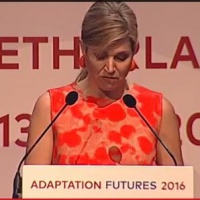Queen Of The Netherlands: Financial Inclusion Required To Help Smallholder Farmers Adapt To Climate Change
Subsistence farmers are often among the world’s most poor and they will need access to financial products if they are to adapt to climate change and the extreme drought, floods and storms it brings, the Queen of the Netherlands said during an adaptation conference this week, highlighting the role banks and investors must play.

12 May 2016 | ROTTERDAM | Netherlands | All sectors of society require access to financial services, Queen Maxima of the Netherlands reminded participants during an adaptation conference happening in Rotterdam this week. She says globally 2 billion are excluded from these services, with 80% of the world’s poorest lacking access. And amid her call to break down the barriers that exclude parts of society from the financial system, Maxima zeroed in on small and medium sized enterprises (SMEs) but also smallholder farmers, the backbone of any given economy, she says, and often those hardest hit by the changing climate.
“The financial sector, techs, banks, cooperatives, or any other, is a vital partner in helping individuals and communities that are vulnerable to the impacts of climate change,” she says.
Maxima is the UN Secretary General’s Special Advocate for Inclusive Finance for Development and gave a keynote address, opening a plenary session Wednesday at the Adaptation Futures conference, a biennial event the Global Programme of Research on Climate Change Vulnerability hosts. The conference brings together academics, policymakers, private sector actors and practitioners to discuss existing practices while conjuring up solutions for looming challenges.
The queen explains that most subsistence farmers invest in animals or housing and when an extreme weather event happens, these savings are then wiped out.
“Financial services would reduce their vulnerability and enhance their ability to really escape poverty,” Maxima says. “Saving accounts can help by using funds acquired during better times to cover the harder times.”
The Insurance Lifeline
Insurance is another key service of the financially secure world and one Maxima notes during her speech. It’s often required when farmers decide to shift activities, grow a new crop or increase livestock, which almost always adds a new layer of risk as agricultural producers need time to generate a return from their new investment. Without financial services, this is often time they don’t have. Many smallholder farmers can’t afford a year with low yields, Maxima says.
This is where insurance comes in, the queen explains, as it can help manage the risk associated with adapting to a new farming regime.
She notes that the insurance sector is becoming involved with innovative tools, such as weather-based schemes, which protects small farming households from weather-related crop losses. The Kilimo Salama (safe farming in Swahili) Weather Index Insurance in Kenya is one example that the queen highlighted.
The program is affordable for both the farmers and insurance provides largely because of telecommunications, mobile phone technology. As explained in a program document, farmers receive their policy numbers and premium receipts via texts while providers send payouts through a mobile banking system.
“This program will offer farmers who plant as little as one acre insurance policies to shield them from financial losses when drought or excess rainfall is expected to ruin their harvest,” Maxima says.
Kilimo Salama, which is as a partnership between the Syngenta Foundation, UAP insurance and telecom giant Safaricom, began with a pilot project in 2009 and the queen notes that different sectors should be engaging in public private partnerships more. For Kilimo Salama, the results are positive thus far. Maxima cites data that finds insured farmers are able to invest 20% more in their farms and earn 16% more income than uninsured producers.
Boosting Climate Resilience in SMEs
And a similar line of thought goes for SMEs, Maxima says, which also need financial services tailored to their specific needs. SMEs are an important source of livelihood in all parts of the world, developed and developing, but, unlike big corporations, SMEs often lack the capacity to build resistance against climate change. And it doesn’t take much to help, the queen says, a loan or single insurance payment goes a long way in helping a small business get back on its feet.
Though, prevention is always better than the cure, she says. “Enabling SMEs to access financial products and instruments will in essence increase their resilience.”
The digital world is helping this happen, with such initiatives like Digital India, which aims to give all citizens reliable connectivity so they have access to government services. This includes financial services Indians will be able to access online.
Creating a Fair and Sustainable World
Moreover, Maxima highlights private sector involvement and their pledges, particularly those from banks and institutional investors, during the Paris climate talks in December to scale up investments in clean energy, green bonds and overall low carbon development.
However, she stresses much more private sector commitment is needed. “The financial sector will have to play a much more important role in contributing to climate change adaptation,” Maxima says. To put this in perspective, the World Bank estimates developing countries will require $70 billion per year until 2015 to meet current and future adaptation needs.
True climate adaptation, she says, must take the form of bankers working hand-in-hand with smallholder farmers and suppliers working collaboratively with civil society, technology companies and government. The queen adds that climate adaptation is essential to proper development and development is critical in creating the new economic opportunities that spell success for private sector entities, not to mention it enables poverty alleviation and sustainable livelihoods for the world’s poor.
“Only when we work together can we ensure that development and equitable growth are sustained despite the effects of climate change,” Maxima says.
Please see our Reprint Guidelines for details on republishing our articles.

